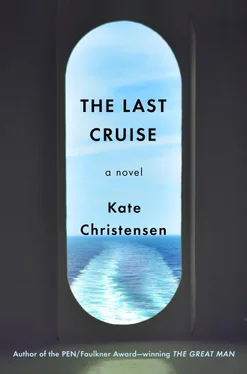“Pleasure,” said the captain, turning to look at Christine while he shook Valerie’s hand. “Hello there.”
“This is my friend Christine Thorne,” said Valerie.
He looked Christine up and down with blatant appraisal. “Where did you come from?” His accent was midwestern.
“Maine,” said Christine. “A farm, actually.”
“Oh. What kind of farm?”
“Vegetables and chickens. It’s small. My husband and I own about twelve acres.”
“I grew up on a huge farm in Wisconsin,” he said. “We grew corn. Nothing but. It’s nice to have a little variety, don’t you think?”
Christine glanced at Valerie, who narrowed her eyes in a smirk.
“This is such a beautiful old ship,” said Valerie.
“Yes?” he said, turning away from Christine with a hint of reluctance.
“You must love being in charge of it.”
“She’s a great relic, for sure,” said the captain, smoothly refocusing his attention as if he’d hit a button on the control panel in his forehead and his internal rudders had swiveled, far below. “I hope you’re enjoying the cruise.”
Just then, a young woman in a Cabaret crew uniform approached the captain and began to speak rapidly into his ear.
“It’s a bit of a working vacation,” said Valerie to the air where the captain had been standing a second ago. She shot a grin at Christine, pretending to confess to her imaginary listener. “I’m talking to a lot of interesting people for a book I’m writing.”
“You’re a writer?” asked Tye Blevins, who had been talking until now with seeming total absorption to Cynthia Perez, but apparently with one ear cocked at their conversation. “I’m a writer too. Dry academic stuff. What are you working on?”
“It’s still early days,” said Valerie, her face instantly alight with the pleasure of discussing her work with anyone who took an interest in it. “I’m going for a portrait of workers at the lowest levels of various industries, the people on the ground who keep things running. Who are they, what are their experiences.”
Tye’s eyes were lasers. “You’re interviewing the staff on board?”
“Oh God no,” said Valerie, waving the question away with breezy firmness. “I’m on vacation.”
“Right,” said Tye. “I get it.”
“Hello, everyone,” called Kimmi, the cruise director. She raised a glass of champagne to the room at large. “Welcome. We have a special group tonight, and it’s good to see you all getting to know one another.”
“Hear, hear,” said the captain, who had freed himself from his underling and now stood next to Kimmi, holding his own glass up. “Welcome, everyone. Cheers.”
Two of the waiters flung open the tall double doors at the end of the lounge, and Christine walked with everyone else into the small dining room. She gazed around. The arched ceiling was painted sky blue with a few fluffy clouds, its rim edged in gold leaf. The walls were paneled in bamboo. Amber-colored teardrop sconces protruded at intervals. The long table down the middle of the room was draped in white linen and set with china, silver, and crystal, tall white tapers burning in candelabras. Next to each plate, Christine saw a hand-lettered place card and an individual glass bud vase containing a single white peony in full bloom. Open French doors led out to a balcony beyond the sideboard and small bar. Warm air blew in and made the flames flicker.
“Dude, we’ve been slumming it till now,” said Valerie, lifting a bud to her nose. “Finally, the VIP treatment.”
The Sabra Quartet played in an alcove. Miriam gave her violin a little dip in greeting when Christine caught her eye.
*
The quartet had agreed on the sweetly gorgeous, deceptively simple Borodin for tonight’s program, followed by Rochberg’s modern offbeat variations on Pachelbel’s overplayed Canon, and then the Tchaikovsky as a digestif, because it was exciting and sparkling and energetic and would send everyone away in a good mood. These three quartets were easygoing staples of the Sabra’s repertoire, not too taxing for any of them, which was all to the good, because both Isaac and Jakov claimed they’d come down with mild stomach bugs. Miriam suspected it was just a touch of seasickness, pure and simple, but they both adamantly denied it, as they always did, on every cruise.
During the Borodin’s first movement, the dinner guests drifted into the dining room with the captain and senior officers. As Christine walked in, Miriam ogled her admiringly, noting how well she carried herself. The green dress suited her figure, and she had the height and the curves to carry it off and the broad shoulders to offset the strapless bodice. And the girl next to her, the friend who had brought her on the cruise, what was her name? Nicole? Melanie? Valerie. She looked exactly the way Miriam had expected her to look, based on Christine’s brief description of her: slinky, audacious, twitching with self-regard. Miriam watched her position herself vis-à-vis Christine and flick a glance at her friend, a quick naked dart of some pure emotion that was almost certainly envy.
Miriam could empathize. She herself had been sexy as a young woman, a “dish” as they called it back then, but she’d never been a beauty; she’d always known it and had focused on cultivating both style and moxie, and not worrying too much about her looks themselves. And as she got old, she accepted the double-edged necessity and luxury of fading away into the background to observe invisibly, as she was doing now. Had she been beautiful, she would have mourned the loss. Instead, she had achieved over her lifetime a cheerful, confident ease in herself that felt, in old age, like female triumph.
As the first movement ended, Miriam watched Larry Weiss come into the dining room, tall and imposing in a tuxedo, with Rivka tottering on his arm in very high heels and a fitted cream-colored sparkly dress, the usual gauzy scarf fluttering over her bony shoulders. The Weisses as a matter of course glanced over at the quartet with impersonal, proprietary affection, but did not, apparently, notice Miriam watching them. Larry went over to the bar while Rivka and Valerie introduced themselves and stood chatting. To Miriam, watching from afar, they seemed to be two of a kind: ambitious, shrewd, stylish women. Rivka, like Valerie, had a dramatic, near-skeletal chicness that offset her own odd looks. But unlike Miriam, she had refused to accept invisibility in her old age, and she was rich enough to have the luxury of any and every mitigating means available. Her armor included plastic surgery, a subtly youthful coif, flowing scarves, eye-catching jewelry. Like Valerie, she was all tautness and attitude. Both of them caught and held attention like bare fishhooks hung with glittering lures.
Sasha lifted his violin and glanced to his left. As she had done for fifty years, Miriam turned to the right and caught his eye, the signal. As the corner of his mouth lifted slightly, she almost melted with love, but, always professional, she only nodded back at him slightly, as did Jakov and Isaac to her left. Instantly, the quartet was a unit, coalesced. Sasha brought his violin down to bring them all in, and the scherzo began.
*
Christine found herself seated between Tye the Yale historian and a dashing chief officer named Tom. The captain sat at the head of the table flanked by Rivka Weiss and Cynthia Perez, with Kimmi at the foot between Larry Weiss and Philip the hotel director, a slender man who had a voice so deep it sounded like a foghorn. Christine had been sure at first that he was just putting it on to be funny, but he’d kept it up all night.
All four of the ship’s top-ranking officers were American, white, male, ostensibly Christian, and ostensibly straight, although of course you never knew. And all of tonight’s guests were a mixture of black, Hispanic, female, Jewish, and possibly gay. Christine noticed this with the same half-conscious bemusement with which she speculated about the waiters. Were they Filipino, Mexican, Malaysian, or Dominican? They were all dark-haired and -skinned, but according to Valerie, Cabaret hiring practice dictated that there couldn’t be too many people from the same country, or who spoke the same language, to prevent them from organizing against their working conditions. So Christine deduced that Cabaret deliberately hired a variety of similar-looking waiters who spoke different languages, which she found disturbing on several levels.
Читать дальше












